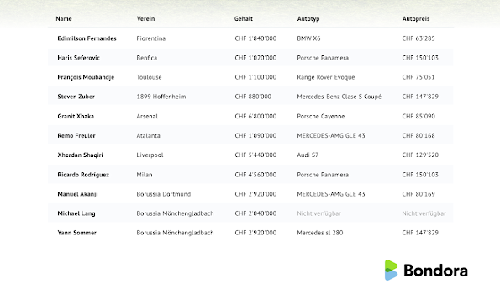Switzerland may have a comparatively uncompetitive domestic football league, but its exponents remain much sought after abroad. There, they tend to earn salaries that make them attractive for private banks, a study compiled by the fintech Bondora shows.
Professional footballers are a relatively recent target market for private banks – no wonder given their million-franc salaries. The peer-to-peer credit platform Bondora compiled the incomes of the Swiss national team members and compared their wages with the national average.

Granit Xhaka Beats Xherdan Shaqiri
The highest earner is midfield maestro Granit Xhaka, who’s under contract at Arsenal London. He receives an annual salary of 6.8 million Swiss francs ($6.8 million). The runner up is – no big surprise there – Xherdan Shaqiri, the little wizard who moved to Juergen Klopp’s Liverpool Football Club in the summer. Shaqiri, who currently enjoys something of a second spring alongside the likes of Mohamed Salah, takes home 5.4 million francs.
The lowest income earned by a member of Switzerland's first eleven is 880,000 francs. It is Steven Zuber's, a winger who plays for TSG 1899 Hoffenheim in Germany. Manuel Akanji, the central defender and rising star among the Swiss, earns 2.92 million francs a year, courtesy of Borussia Dortmund, the current leaders in the Bundesliga.
Modest Car Taste
The Swiss players seem to have a comparatively modest car taste. While Ronaldo owns a 2.3 million-euro ($2.62 million) Bugatti Veyron, one of the world’s most coveted cars, the Swiss don’t seem to spend more than some 150,000 francs on theirs.
Ricardo Rodriguez of AC Milan and Haris Seferovic, the Benfica Lissabon striker, both drive a Porsche Panamera, while goalkeeper Yann Sommer owns a Mercedes SL280. Edimilson Fernandes, who also plays in Germany, at Eintracht Frankfurt, reportedly has the cheapest car, a BMW X6.
Wasteful Footballers
Spending money on expensive cars that are sold in larger volumes tends to be a wasteful exercise. That seems to sum up footballers’ cavalier attitude towards money, a study released in 2016 by Freymund & Cie had shown.
Some professional elite sportsmen earn a lot of money for a very limited time period. Very often they see their careers cut short through injuries. Freymund & Cie therefore urged footballers to stick to a simple financial plan: 65 percent in equities and fixed income securities, 15 percent in real estate, 5 percent for charities and 15 percent for hobbies and passions – that presumably includes the cars mentioned earlier.






























